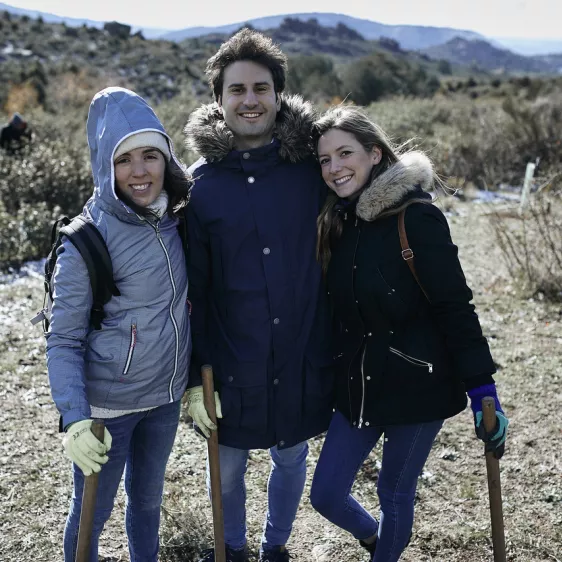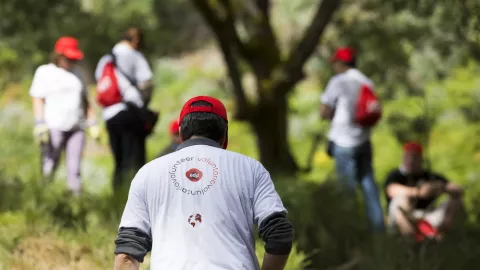is as simple and as complex as paying "full attention". Integrating it into daily life can begin by internally reflecting on some questions: How do I set my priorities? Do I do so consciously or am I simply a slave to whatever grabs my attention? How do I behave in a meeting? Do I allow myself to be distracted or am I present with whoever is with me? Do I allow my phone and its notifications to drag me away? Or am I consciously choosing where I direct my attention? How am I when I drive from home to the office? Do I take decisions throughout or am I in automatic mode?
At EDP, the Mind Your Mind campaign, celebrated during October, aims to stimulate these questions through workshops, talks and other content on everything that can benefit mental health, such as daily concentration habits or Minfulness.
One of the benefits of integrating Mindfulness practices, not only at specific times, when the external stimulations are reduced, but also in short breaks throughout the day, is precisely switching off automatic pilot. Short conscious moments, with one or two breaths that are more intentional, typically before starting new tasks or moving between them, can be reviving and bring focus. It relates to refining the way we are in our daily tasks and this typically contributes to our
.
The benefits go beyond attention. We become more aware of our cognitive side, that is, our ability to relate healthily to our flow of thoughts and to physiological experiences such as stress. Once stress is perceived as a bodily phenomenon, it is possible to re-establish balance by, for example, using mindfulness practices.
It is impossible to speak of the benefits of introducing mindfulness practices without mentioning an internal debate for many: the emotions. We can start managing our emotions once we are aware that we are emotional creatures. Balance comes from what we do with them. We don't have to just fall into one of these two extremes: suppress our emotions or being overcome by them and express everything that comes into our minds. There is balance at the centre, which is achieved and very sustained by Mindfulness practises.
So, how can Mindfulness be integrated into daily life? And what forms does it take? There isn't one, universal answer that is right for everybody. Each individual has to find their own path, whether it is through meditation, through practising physical activities such as yoga, or by journaling. Mindfulness is a personalised way of life, as shown by the experiences of different EDP employees.
Teen Yen Lee - Brand Engagement, EDPR (Singapore)
“My yoga journey began two decades ago and I started my conscious breathing practice last year. It was difficult to create new breathing habits. However, I discovered that regular practice sharpens my senses. I have noticed I am more introspective and I listen better.
Mindful breathing is a key part of my routine. Every morning, I sit cross-legged on the floor –normally on my rug with a candle burning – and concentrate on my breath for at least 10 minutes. This daily mindful breathwork begins and ends with a little sound therapy with a tongue drum or my tingshas which is a type of ceremonial cymbals used by Tibetan Buddhists. When I am in the mood for guided meditation, I use apps such as Headspace or Calm.
It is easy to incorporate mindful breathing in our daily lives – we breathe between 20,000 to 25,000 times per day! At work, I practice a technique called “A Minute to Arrival” before beginning any task. It is from a Mindfulness programme based on neuroscience, created by Google, that taught me useful tips at the peak of the pandemic on how to deal with challenging situations through mindful practices.
This is how it works: inhale smoothly and slowly through the nose for a count of four, hold the breathe for two, exhale smoothly and slowly also through the nose for a count of eight, hold the breathe for two; repeat three rounds. This takes about one minute. My mind feels calm and I feel ready for whatever comes next after this simple breathing exercise.
Depending on how my day has been, I may do some focused breathing exercises before sleeping. I like to think that, with my breathwork practice, I am more empathetic towards others, and perhaps, also gentler on myself.”

Diana Ferreira - Learning and Development, EDP Comercial
"I first came into contact with Mindfulness eight years ago when reading a health magazine. The term was still not very newsworthy and it sparked my interest. As I have a background in psychology and an interest in neurosciences, I went searching for further information. I began reading books on the subject and have already done two Mindfulness courses.
In the beginning, it was not easy, because I felt frustrated and impatient. We think that meditation is to calm us down and not to make us uncomfortable and irritated. It was through practice that I learned to be gentle with myself, that some days went better than others, and with time, I discovered that different strategies work best on different days, such as reading a book, listening to a podcast, journaling, cooking or walking through nature. There is no perfection, not even with meditation.
I have practised meditation every day for two years, guided by the Calm app, at the end of the day, in silence. It's like brushing my teeth: I feel strange when I don't do it! In addition, I practice body balance or Pilates once or twice per week to have greater connection between my mind and body. I consider this another form of meditation, in which I train my ability to concentrate, to coordinate movements and breathing.
In choosing to train the ability to pay undivided attention – which is fundamentally what meditation is – I care for myself, I have more self-awareness, I manage my emotions better and I am focused on the tasks I have to perform, rather than being a robot."

For Diana Ferreira and Teen Yen Lee, Mindfulness is a routine they have developed individually, in accordance with what completes their day and enables them to be more conscious of their body and mind. From breathing exercises to guided meditation, passing through physical activities such as Pilates, there is a personal journey that everyone is capable of tracing!
Our heart and energy drive a better tomorrow
Well-being and benefits
Our people are the priority
Because we want to ensure a positive and impactful experience for our people, guaranteering individual well-being is one of our top priorities. October is the month of mental health, in which we promote initiatives for everyone's happiness and growth.




